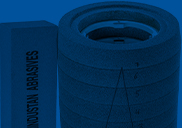For trade & export related inquiry, call  91-9810029966
91-9810029966
For trade & export related inquiry, call  91-9810029966
91-9810029966

Centerless grinding is a machining process that uses
abrasive cutting to remove materials from a workpiece.
Centerless grinding differs from center type cylindrical
grinding operation in that no spindle is used to locate and
secure the workpiece, the workpiece is secured between
two rotary grinding wheels, and speed of their rotation
relative to each other determines the rate at which material
is removed from workpiece.
Our experts understand difficulties of grinding, recommend best ceramic or resin based abrasives material for better results for grinding jobs.
| Grain | Grit size | Grade | Diameter | Thickness | Structure |
|---|---|---|---|---|---|
| BA | 36-120 | G-P | 300-600 | 75-300 | 5 |
| BS | 36-120 | G-P | 300-600 | 75-300 | 5 |
Our experts understand difficulties of grinding, recommend best ceramic or resin based abrasives for better results
Centerless Grinding Wheels is a very similar method of grinding like cylindrical grinding wheels but the only difference is that this is without a spindle.
In Centerless grinding machine, it holds the job between two wheels, rotating in the same direction at different speeds, and a fixture platform.
One wheel, known as the grinding wheel, is on a fixed axis and rotates, such that the force applied to the job is directed downward, against the fixture platform.
This wheel usually performs the grinding action by having a higher tangential velocity, than the job at the point of contact.
The other wheel, known as the regulating wheel, is movable. It positions this wheel to apply lateral pressure to the job and usually has either a rough or rubber-bonded abrasive to trap the job. The regulating wheel specifications are also decided by the job to be ground.
The speed of the two wheels relative to each other provides the grinding action and determines the rate at which it removes material from the job. During operation, the job turns with the regulating wheel, with the same linear velocity at the point of contact and (ideally) no slipping. The grinding wheel turns faster, slipping past the surface of the job at the point of contact and removing chips of material as it passes.
Centerless grinding Wheel size is of thickness 100 mm or more. As it is a without spindle application, the thickness has to be high (100 mm or above), to feed the job without holding the same.
We can also say it is grinding the outer surface of any cylinder and hence can be called as OD grinding wheels, supported vertical Centre as a stationary work rest blade and moving between cylindrical wheel & Centerless wheel.
Our Centerless grinding wheels are specially designed for applications like bearing, automotive and bar grinding of various materials. These Centerless wheels are specially designed for
1. Through feed
2. In-feed
3. End feed grinding
We as manufacturers of grinding wheels are proud by our achievement in terms of customer satisfaction. Grinding wheel selection chart and grinding wheel grade chart helps in taking the right decision for using the wheels
The thickness of Centerless Grinding Wheel is always more than Cylindrical Grinding Wheels
when the cylindrical work is not supported on fixed centers but by a combination of work rest blade, regulating wheel & grinding wheel itself, the operation is called a centerless grinding.
In centerless through feed grinding is movement of work parallel to the axis of grinding wheel and the work between regulating wheel and grinding wheel.
Hindustan Abrasives centerless wheel is made from sharp aluminium oxide and silicon carbide grains suited for a variety of materials and applications like bright bar grinding, OD grinding of outer & inner bearing rings etc.Better cutting action capabilities, better surface finish and no lobing in work piece.
 Need more information?
Need more information?Request a call back to schedule your call with our VP sales.
